NEWS ANALYSIS: It’s been nine years since a young Norwegian man set off an unprecedented wave of right-wing extremist terror in his homeland and killed 77 people, most of them younger than himself. The Corona crisis has curtailed annual July 22 memorial ceremonies this year but survivors and victims’ families won’t ever forget the terror, not least as questions swirl over what’s really been learned since July 22, 2011.
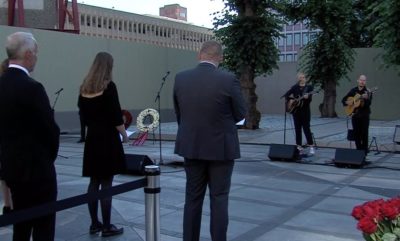
Prime Minister Erna Solberg was among those speaking Wednesday morning at what’s become a traditional ceremony at the bombing site. Also speaking were the leader of the national survivors’ organization Lisbeth Røyneland, and Ina Libak, leader of the Labour Party’s youth organization AUF that was the terrorist’s main target. The morning memorial was to be followed by another memorial ceremony on the island of Utøya, where AUF holds its annual summer camp. Solberg was due to speak there, too, along with Labour Party leader Jonas Gahr Støre.
Norwegian Broadcasting (NRK) was covering the ceremonies live while they were otherwise shared on digital platforms. “We couldn’t meet the (Corona) regulations that limit gatherings to just 200 people,” Røyneland told news bureau NTB. “I think it’s quite sad. This is usually a typical hugging situation, a day when we can meet each other again and share memories with good conversations and give each other good hugs, but we must, of course, follow the rules.”
Libak, who was shot herself during the terrorist’s massacre on Utøya, agreed: “I think this is really too bad, and I think there are others who think the same, but I also think everyone understands that this is the way it has to be, because of the Corona situation we all have to live with.”
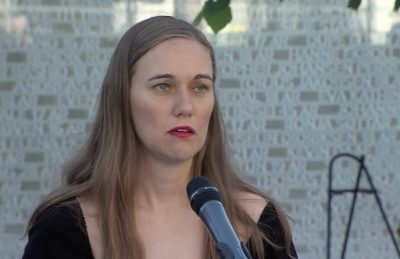
Both Røyneland and Libak were expecting worthy national memorials regardless of the restrictions. They’re most concerned that no one ever forgets how a young Norwegian man could be so racist and obsessed with white supremacy that he would bomb Norway’s government headquarters, killing eight people, because he blamed the government for allowing immigrants into the country. Then, dressed like a police officer, he drove to the ferry landing for AUF’s summer camp on the island of Utøya, where he unleashed a massacre that killed another 69 people and wounded scores of others. Most were young Labour Party members, and he later testified that he wanted to kill off the next generation of Labour politicians including Libak, claiming they were too lenient on immigration issues.
His actions stunned a whole world, but such racially and religiously motivated attacks haven’t stopped. On the contrary, they’ve made headlines again from New Zealand to the US, and recently set off global demonstrations against racism and right-wing extremism.
Speakers on Wednesday all noted that a similarly motivated attack struck Norway again just last summer, when a young Norwegian man from a relatively affluent family shot and killed his Chinese-born adopted sister at home. Dressed up in battle gear, he then drove to the local mosque in the Oslo suburb of Bærum and intended to set off another massacre against Muslims. His plans were foiled when he found only a few elderly men at the mosque and they quickly overpowered him after he fired just a few shots.
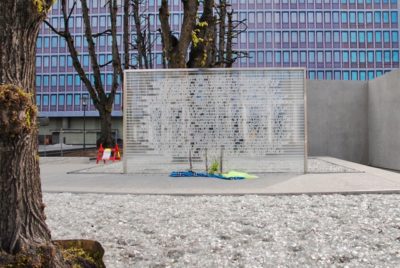
His motives, however, were a chilling “echo of July 22,” as newspaper Dagsavisen editorialized earlier this month. That’s when an evaluation of the police response to the would-be tragedy was released, and once again raised questions and criticism of Norway’s preparedness for more tragedy.
Newspaper Aftenposten reported soon afterwards that only seven police officers were on duty in the entire police district that extends from west Oslo through Bærum and parts of Asker. Around 365,000 people live in the district, and not only were they protected by just seven local officers, those closest to calls for help from the mosque were still several kilometers away and unfamiliar with the area. They had to rely on Google maps to get to the mosque in Skui, and they weren’t updated.
That brought back memories of hapless police officers and commando troops in a small borrowed boat trying to get to Utøya eight years earlier. The official evaluation of last summer’s mosque attack prompted questions as to whether the police found their response “embarrassing” once again.
“I wouldn’t call it embarrassing,” Oslo Police Chief Beate Gangås told Aftenposten, “but I see here that there are things here we must work on continually.”
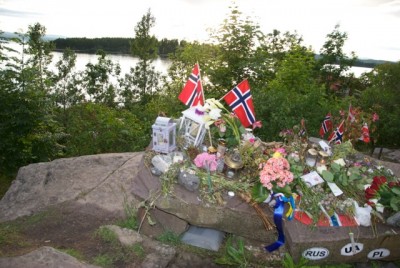
Aftenposten reported soon after that, however, that only one (1) person is on duty after 4pm and on weekends at what it called the “most important connection among emergency forces in the case of major national crises.” It’s called the police’s “situation center,” and it was formally opened by former Justice Minister Anders Anundsen of the Progress Party in January 2016 on what he called “an important day for national security.” Also called the new “terror center,” Anundsen claimed it represented “a quantum leap” for national preparedness. Prime Minister Solberg has called the police “situation center” one of the most important measures her government has put in place since the July 22 attacks nine years ago.
“The police (who are under the justice ministry’s control) will now be much more ‘hands on’ when something happens,” wrote newspaper VG when the center opened. But when the mosque attacker struck on a Saturday afternoon in August last year, only one person was on duty and that’s “normal” from 4pm until 7am the next day, and on weekends.
Tone Vangen, director of preparedness for the state police directorate, wouldn’t comment on whether having just one person on duty was adequate. She claimed, though, “that we take the evaluation (of response to last year’s attack) very seriously and will use it in our ongoing work.”
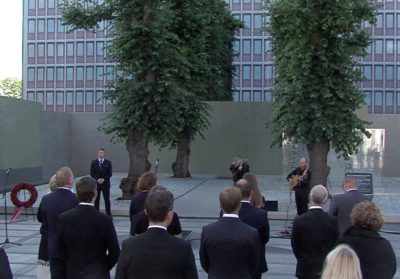
Norway’s lack of preparedness for the July 22 attacks in 2011 revealed major weaknesses both in the police’s own internal alarm systems and response coordination. Three so-called “national alarms” were sent out, but they weren’t registered at other police districts. Nine years later, the evaluation of the mosque attack response concluded that the situation center is not capable of doing the job it’s supposed to do. “Expectations are not in line with staffing,” wrote Aftenposten.
Norway’s police intelligence agency PST was also affected by scant holiday staffing when tips came in about the mosque attacker and his allegedly right-wing extremist tendencies. The new evaluation notes that when the tips came in many months in advance of his attack, there weren’t enough communication workers on the job to pass on the information to possible target groups like the mosque in Bærum.
“We can’t have that,” editorialized Dagsavisen, nor how Norway is clearly more exposed to the risk of attacks during the summer.
‘Can happen again’
Norwegians who survived both the July 22 and mosque attacks still just wish they “could return to normal,” reported newspaper Klassekampen on Wednesday. Lara Rashid survived the massacre on Utøya but lost her sister, who was an aspiring Labour politician. Irfan Mushtaq was the first to arrive at the mosque after the shooting started, and had to wait an agonizing 20 minutes before police arrived. Both stress that halting racism and hatred is the most important goal of all.
Labour Party leader Jonas Gahr Støre agrees. “July 22 showed us that it’s a short way from attitudes to action,” he told NTB this week. “That was repeated in August last year. Everyone with any sense of responsibility must see that this can happen again.” The question remains whether Norway is prepared, while most agree the country still has a lot to learn.
Among those attending the restricted memorials on Wednesday was Jens Stoltenberg, who was Labour Party leader and Norway’s prime minister on July 22, 2011 and now serves as secretary general of NATO: Memorial ceremonies remain important, he said, for several reasons:
“In part to remember and pay tribute to those who were killed, were badly injured and those who lost their loved ones,” Stoltenberg told NRK. “It’s also important to politically mark the important values that were attacked on July 22.
“We see that such values are also threatened today,” Stoltenberg continued. “We have seen new attacks in our own country and other countries. That makes it important to still stand up for an open, democratic society.”
NewsInEnglish.no/Nina Berglund

